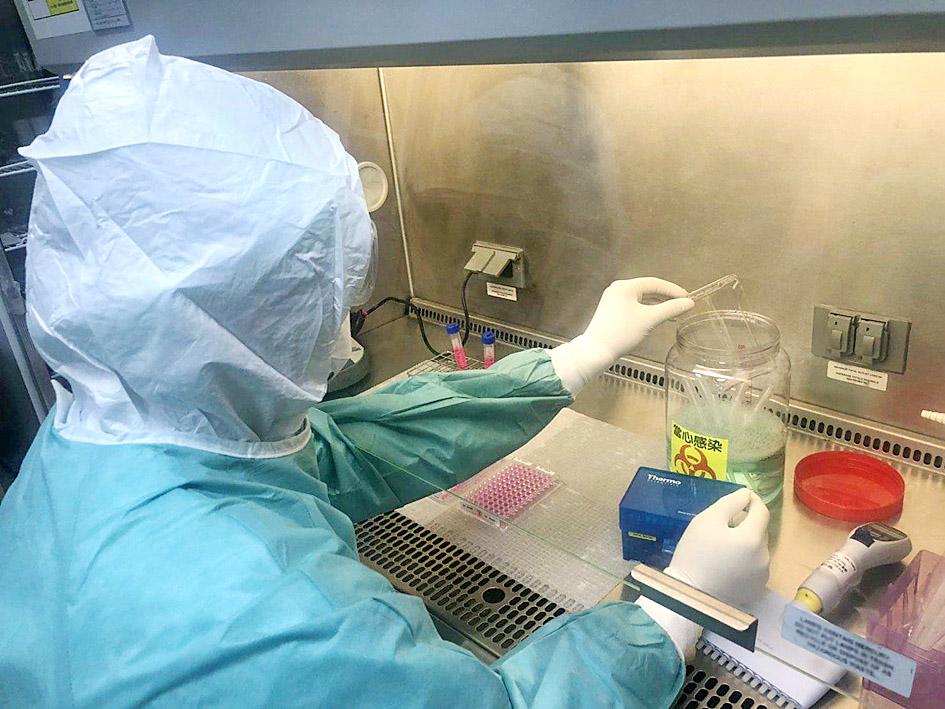A research team based in Taiwan has found a key antibody that has the ability to neutralize SARS-CoV-2, the novel coronavirus that causes COVID-19.
The team, led by Huang Kuan-ying (黃冠穎), a doctor in the Department of Pediatric Infectious Diseases at Chang Gung Memorial Hospital’s Linkou branch in New Taipei City, is comprised of researchers from the hospital, Chang Gung University, Academia Sinica and the Institute of Preventive Medicine at the National Defense Medical Center, as well as Oxford University in the UK.
The team on Thursday said that it examined antibody function through immunofluorescence assays, neutralization tests and plaque reduction neutralization tests.

Photo courtesy of Linkou Chang Gung Memorial Hospital.
Tests with strains from different clades, including strains from China, the US, Europe and Egypt, showed an equivalent neutralization effect of 90 to 98 percent, it said.
The test results demonstrated the potential of SARS-CoV-2-neutralizing human monoclonal antibodies for the development of prophylactic and therapeutic products, it added.
Chang Gung University Research Center for Emerging Viral Infections director Shih Shin-ru (施信如) said that for the coronavirus to infect the body, it has to integrate with a protein attached to the surface of human cells called angiotensin-converting enzyme 2.
The antibody discovered by the team can prevent this process by integrating with the enzyme first, thus blocking the coronavirus’ path to infection, she said.
The team plans to use the antibody to develop medication, Shih said, adding that it would next month meet with manufacturers, which would conduct further trials before beginning mass production.
If all goes well, the medicine could be on the market by the end of this year, she said.
Although the antibody has shown promising results in human cell testing, Shih said that as no clinical trials have been conducted, it is still uncertain how it would perform in COVID-19 patients.

A preclearance service to facilitate entry for people traveling to select airports in Japan would be available from Thursday next week to Feb. 25 at Taiwan Taoyuan International Airport, Taoyuan International Airport Corp (TIAC) said on Tuesday. The service was first made available to Taiwanese travelers throughout the winter vacation of 2024 and during the Lunar New Year holiday. In addition to flights to the Japanese cities of Hakodate, Asahikawa, Akita, Sendai, Niigata, Okayama, Takamatsu, Kumamoto and Kagoshima, the service would be available to travelers to Kobe and Oita. The service can be accessed by passengers of 15 flight routes operated by

Chinese spouse and influencer Guan Guan’s (關關) residency permit has been revoked for repeatedly posting pro-China videos that threaten national security, the National Immigration Agency confirmed today. Guan Guan has said many controversial statements in her videos posted to Douyin (抖音), including “the red flag will soon be painted all over Taiwan” and “Taiwan is an inseparable part of China,” and expressing hope for expedited reunification. The agency last year received multiple reports alleging that Guan Guan had advocated for armed reunification. After verifying the reports, the agency last month issued a notice requiring her to appear and explain her actions. Guan

GIVE AND TAKE: Blood demand continues to rise each year, while fewer young donors are available due to the nation’s falling birthrate, a doctor said Blood donors can redeem points earned from donations to obtain limited edition Formosan black bear travel mugs, the Kaohsiung Blood Center said yesterday, as it announced a goal of stocking 20,000 units of blood prior to the Lunar New Year. The last month of the lunar year is National Blood Donation Month, when local centers seek to stockpile blood for use during the Lunar New Year holiday. The blood demand in southern Taiwan — including Tainan and Kaohsiung, as well as Chiayi, Pingtung, Penghu and Taitung counties — is about 2,000 units per day, the center said. The donation campaign aims to boost

The Central Weather Administration (CWA) said a magnitude 4.9 earthquake that struck off the coast of eastern Taiwan yesterday was an independent event and part of a stress-adjustment process. The earthquake occurred at 4:47pm, with its epicenter at sea about 45.4km south of Yilan County Hall at a depth of 5.9km, the CWA said. The quake's intensity, which gauges the actual effects of a temblor, was highest in several townships in Yilan and neighboring Hualien County, where it measured 4 on Taiwan's seven-tier intensity scale, the CWA said. Lin Po-yu (林柏佑), a division chief at the CWA's Seismological Center, told a news conference